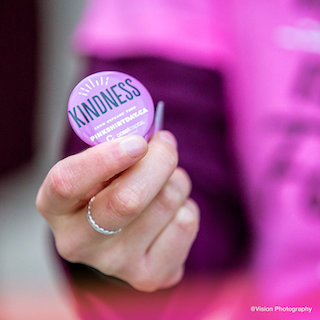Current Temperature
4.7°C
Pink Shirt Day 2019 — kindness always encouraged at Magrath Elementary School
Posted on February 14, 2019 by admin
By Stan Ashbee
Westwind Weekly News
Magrath Elementary School is excited to be promoting Pink Shirt Day 2019 on Feb. 27. MES is looking forward to seeing a sea of pink at the school to raise awareness about bullying and to remind students to be kind.
Bullying is a major problem in Canadian schools, workplaces, homes, and online. Over the month of February, and throughout the year, Pink Shirt Day aims to raise awareness of these issues, as well as raise funds to support programs that foster children’s healthy self-esteem. Visit pinkshirtday.ca for more information.
“We encourage all of our teachers to talk about kindness and how to be kind. We have a friendship bench outside on our playground we talk about on that day. We really put a spin on it for being kind, making sure everybody has a friend, and everybody feels included and welcome at our school,” said Julie Gilson, MES vice-principal.
Most schools, Gilson explained, have a friendship bench designated as a place for students to go if they don’t have anyone to play with. “The idea is — somebody else will see you sitting there by yourself and they will go over and sit with you and visit or might even play.”
Now a movement celebrated across the globe, Pink Shirt Day has humble beginnings — inspired by an act of kindness in small-town Nova Scotia, according to the Pink Shirt Day official website. David Shepherd, Travis Price and their teenage friends organized a high-school protest to wear pink in sympathy with a Grade 9 boy who was being bullied for wearing a pink shirt, it was stated in a Globe and Mail article reporting on the incident. The teenagers took a stand against bullying by protesting the harassment and distributed pink T-shirts to all the boys in the school and a day to rally against bullying was born. The idea has only grown each year, with worldwide support and participation including at local southern Alberta schools.
“I really feel our school is getting better, there’s always the little issues that come up, but as whole and as a school community we have a really good perspective on being kind and our kids are kind, in general,” said Gilson. “We don’t have a lot of issues at our school.”
According to Red Cross Canada, bullying is a form of aggression where there is a power imbalance; the person doing the bullying has power over the person being victimized. In additional to any physical trauma incurred, bullying can result in serious emotional problems, including anxiety, low self-esteem, or depression.
Types of bullying includes: Physical bullying: using physical force or aggression against another person (e.g., hitting); Verbal bullying: using words to verbally attack someone (e.g., name-calling); Social/relational bullying: trying to hurt someone through excluding them, spreading rumours or ignoring them (e.g., gossiping); And cyberbullying: using electronic media to threaten, embarrass, intimidate, or exclude someone, or to damage their reputation (e.g., sending threatening text messages).
Bullying and harassment are similar, yet different: Harassment is similar to bullying because someone hurts another person through cruel, offensive and insulting behaviours; And harassment is different from bullying in it is a form of discrimination.
Discrimination is treating someone differently or poorly based on certain characteristics or differences. Bullying turns into harassment when the behaviour goes against Canada’s Human Rights Laws and focuses on treating people differently because of: Age; Race (skin colour, facial features); Ethnicity (culture, where they live, how they live, how they dress); Religion (religious beliefs); Sexual orientation (if they are gay, lesbian, bisexual, or heterosexual); Family status (if they are from a single parent family, adopted family, step family, foster family, non-biological gay or lesbian parent family); Marital status (if they are single, legally married, common-law spouse, widowed, or divorced); and physical and mental disability (if they have a mental illness, learning disability, use a wheelchair).
Gilson noted MES fosters kindness every month, to create a kindness culture within and outside the school. “We have a kindness assembly and we honour kids who go out of their way to do extra kind things for teachers or other students or just things even in the community. We’ve had community members phone and say, ‘we saw these kids doing this and that and I know you do kindness assemblies — can you recognize them at your next one.’ It’s just a culture we work really hard to create in our school in all aspects, not just one day a year,” she explained.
Leave a Reply
You must be logged in to post a comment.

